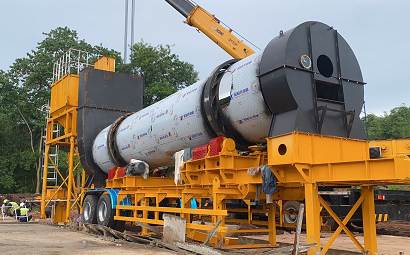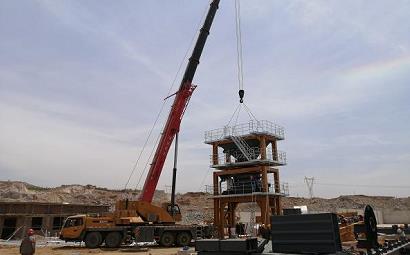1 Personnel dress code
Mixing station staff are required to wear work clothes to work, and patrol personnel and cooperating workers in the mixing building outside the control room are required to wear safety helmets. Wearing slippers to work is strictly prohibited.
2 During the operation of the mixing plant
The operator in the control room needs to sound the horn to warn before starting the machine. Workers around the machine should leave the dangerous area after hearing the horn sound. The operator can only start the machine after confirming the safety of people outside.
When the machine is in operation, staff cannot perform maintenance on the equipment without authorization. Maintenance can only be carried out under the premise of ensuring safety. At the same time, the control room operator must know that the control room operator can only restart the machine after receiving approval from outside personnel.
3 During the maintenance period of the mixing building
People must wear seat belts when working at heights.
When someone is working inside the machine, someone needs to be looked after outside. At the same time, the power supply of the mixer should be cut off. The operator in the control room cannot turn on the machine without the approval of outside personnel.
4Forklifts
When the forklift is loading materials on the site, pay attention to the people in front of and behind the vehicle. When loading materials into the cold material bin, you must pay attention to the speed and position, and do not collide with the equipment.
5 other aspects
No smoking or open flames are allowed within 3 meters of diesel tanks and oil drums for brushing vehicles. Those who put oil must ensure that the oil does not spill out.
When discharging asphalt, be sure to check the amount of asphalt in the tank first, and then open the entire valve before opening the pump to displace asphalt. At the same time, it is strictly forbidden to smoke on the asphalt tank.


Asphalt mixing plant job responsibilities
The asphalt mixing station is an important part of the asphalt pavement construction team. It is mainly responsible for mixing the asphalt mixture and providing high-quality asphalt mixture to the front site on time and in quantity.
Mixing station operators work under the leadership of the station manager and are responsible for the operation, repair and maintenance of the mixing station. They strictly follow the mix ratio and production process provided by the laboratory, control the operation of the machinery, and ensure the quality of the mixture.
The mixing station repairman is responsible for the maintenance of the equipment, adding lubricating oil in strict accordance with the equipment's lubrication schedule. At the same time, he patrols around the equipment during the production process and handles the situation in a timely manner.
Cooperate with the team members to cooperate with the production of the asphalt mixing station. While doing their jobs well, the squad leader cooperates with the repairmen to inspect and maintain the equipment. At the same time, he conveys leadership ideas and organizes the team members to complete tasks temporarily assigned by the leader.
During the mixing period, the forklift driver is mainly responsible for loading materials, cleaning up spilled materials and recycling powder. After the machine is shut down, he is responsible for stacking raw materials in the material yard and completing other tasks assigned by the leader.
The master of the mixing station is responsible for leading and managing the overall work of the mixing station, supervising and inspecting the work of staff at each position, understanding the operation of the equipment, formulating and implementing an overall equipment maintenance plan, handling potential equipment failures, and ensuring that the day's tasks are completed on time and in quantity. construction tasks.
safety management system
1. Adhere to the policy of “safety first, prevention first”, establish and improve safety production management systems, improve safety production internal data management, and carry out safety standard construction sites.
2. Adhere to regular safety education so that all employees can firmly establish the idea of safety first and improve their self-prevention capabilities.
3. Pre-job education must be conducted for new employees to develop the basic knowledge and skills necessary for safe production based on the characteristics of this project; full-time safety officers, team leaders, and special operations personnel can only hold certificates after passing the training On duty.
4. Adhere to the regular inspection system, establish a registration, rectification, and elimination system for problems discovered during inspections, and implement a safety protection system for key construction areas.
5. Strictly abide by safety operating procedures and various safety production rules and regulations. Concentrate on work and stick to your position. You are not allowed to drink and drive, sleep on duty, or engage in activities that affect work.
6. Strictly implement the shift handover system. The power should be turned off after get off work, and mechanical equipment and transport vehicles should be cleaned and maintained. All transport vehicles must be parked neatly.
7. When electricians and mechanics inspect equipment, they should first put up warning signs and arrange for people to be on duty; they should wear seat belts when working at heights. Operators and mechanics should frequently check the use of mechanical equipment and deal with problems in a timely manner.
8. You must wear a safety helmet when entering the construction site, and slippers are not allowed.
9. Non-operators are strictly prohibited from boarding the machine, and it is strictly prohibited to hand over equipment (including transport vehicles) to unlicensed personnel for operation.
 Albanian
Albanian  Russian
Russian  Arabic
Arabic  Amharic
Amharic  Azerbaijani
Azerbaijani  Irish
Irish  Estonian
Estonian  Odia (Oriya)
Odia (Oriya)  Basque
Basque  Belarusian
Belarusian  Bulgarian
Bulgarian  Icelandic
Icelandic  Polish
Polish  Bosnian
Bosnian  Persian
Persian  Afrikaans
Afrikaans  Tatar
Tatar  Danish
Danish  German
German  French
French  Filipino
Filipino  Finnish
Finnish  Frisian
Frisian  Khmer
Khmer  Georgian
Georgian  Gujarati
Gujarati  Kazakh
Kazakh  Haitian Creole
Haitian Creole  Korean
Korean  Hausa
Hausa  Dutch
Dutch  Kyrgyz
Kyrgyz  Galician
Galician  Catalan
Catalan  Czech
Czech  Kannada
Kannada  Corsican
Corsican  Croatian
Croatian  Kurdish (Kurmanji)
Kurdish (Kurmanji)  Latin
Latin  Latvian
Latvian  Lao
Lao  Lithuanian
Lithuanian  Luxembourgish
Luxembourgish  Kinyarwanda
Kinyarwanda  Romanian
Romanian  Malagasy
Malagasy  Maltese
Maltese  Marathi
Marathi  Malayalam
Malayalam  Malay
Malay  Macedonian
Macedonian  Maori
Maori  Mongolian
Mongolian  Bengali
Bengali  Myanmar (Burmese)
Myanmar (Burmese)  Hmong
Hmong  Xhosa
Xhosa  Zulu
Zulu  Nepali
Nepali  Norwegian
Norwegian  Punjabi
Punjabi  Portuguese
Portuguese  Pashto
Pashto  Chichewa
Chichewa  Japanese
Japanese  Swedish
Swedish  Samoan
Samoan  Serbian
Serbian  Sesotho
Sesotho  Sinhala
Sinhala  Esperanto
Esperanto  Slovak
Slovak  Slovenian
Slovenian  Swahili
Swahili  Scots Gaelic
Scots Gaelic  Cebuano
Cebuano  Somali
Somali  Tajik
Tajik  Telugu
Telugu  Tamil
Tamil  Thai
Thai  Turkish
Turkish  Turkmen
Turkmen  Welsh
Welsh  Uyghur
Uyghur  Urdu
Urdu  Ukrainian
Ukrainian  Uzbek
Uzbek  Spanish
Spanish  Hebrew
Hebrew  Greek
Greek  Hawaiian
Hawaiian  Sindhi
Sindhi  Hungarian
Hungarian  Shona
Shona  Armenian
Armenian  Igbo
Igbo  Italian
Italian  Yiddish
Yiddish  Hindi
Hindi  Sundanese
Sundanese  Indonesian
Indonesian  Javanese
Javanese  Yoruba
Yoruba  Vietnamese
Vietnamese  Hebrew
Hebrew  Chinese (Simplified)
Chinese (Simplified)







